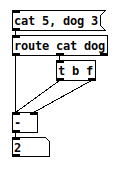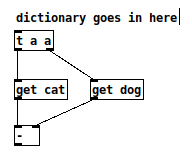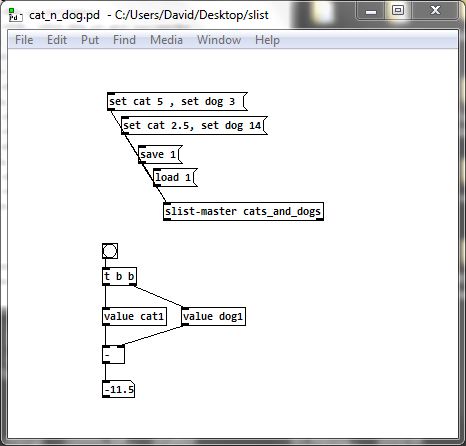@jancsika Fascinating.
It will take me some time to work through data science development since the 18th century.
gensym seems to be used extensively in externals.
60 keys is likely to be a maximum in any control patch I build, but any increased speed would be helpful.
The biggest so far had 64 in each of about 30 stores, where the patch looked up which store to search. Maybe a similar principle although of course no redundant slots.
David.
-
Purr Data GSoC and Dictionaries in Pd
-
@whale-av I tend to be like you. The places I miss key/value pairs the most are the cases where there would typically be less than 10 keys. E.g.:
-
doing math on some values.
pitch * attenuation_levelis way more readable than$f1 * $f2 -
small collections of values, like what comes out the right outlet of soundfiler. It's a travesty that you cannot do
[get - samplerate]on that output-- instead, you have to open up the help patch and manually map list positions to arguments. (And a reader of that patch must do the same if there happens to be an error somewhere.)
This is the problem of making even an elegant, performant, well-documented abstraction for a key/value store-- you cannot extend it to the other places in Pd where you need it.
-
-
@jancsika Just an undeveloped idea..... because I use a small lookup [slist] as part of [slist-master] throughout some patches....
.... a [value x] with a proper hash key "x" table behind it......created when the first [value x] is put, or separately... and so with global variable keys...... so that one could just send the key into its inlet to get the data.
You could add samplerate and other useful keys to it automatically of have a [value pd] that serves up internal parameters.It "sort of" half exists for [expr].
You can do [expr pitch * attenuation_ level] if you first set [value pitch] and [value attenuation_level]....... but of course at the moment every [value] has one slot.
David. -
@jancsika So I have changed [slist-master] so that it uses [value] to distribute globally.
Because I started with lists the second piece of data for foo is assigned to [value foo2] and so can be "got" from anywhere including in [expr]
slist-master.zipUnfortunately [value] doesn't distribute messages across its inlets so its "name" cannot be changed on the fly without extra objects.
External with # please..... although maybe not for lists...... just key/value......?
David. -
So here's what I'm thinking about. I'm not sure if this makes sense in Pd...
In SuperCollider, I can do:
s.boot; (instrument: \something, midinote: 60, sustain: 2, amp: 0.7).play;... and the sound comes from SC's own engine, based on a synth template named
\something.And I can also do:
MIDIClient.init; m = MIDIOut(0).connect(0); (type: \midi, midiout: m, midinote: 60, sustain: 2, amp: 0.7).play;... and the same parameters
midinote: 60, sustain: 2, amp: 0.7are translated into MIDI noteon/noteoff messages, and performed by any MIDI software or hardware synth listening on that port.A concrete benefit is: If I write some compositional algorithm and I want to decide later whether to play it within SC or using an external instrument, I don't have to change the composition logic at all. That part simply stuffs data into Event objects, and the event determines what finally happens.
In Pd, the data and the path the data take through the system are tightly coupled -- positional access to specific values is one way that this manifests, but more significantly, in a way, tight coupling is just the nature of dataflows.
So I'm wondering if this is a way to decouple: you could describe an action as a set of key-value pairs, forward the set to any event-player, and the event player would look up the data that it needs.
To some extent, you can already do this by discrete "key value" messages and [route]ing them into different parts of the player, but this isn't totally transparent: 1. If they are discrete messages, how do you know when the event is complete? Needs a sentinel. 2. [route] takes a little time to ignore irrelevant data (while a dictionary lookup would simply not look up irrelevant data). 3. If the pairs arrive out of order, math ops could be tricky, e.g. the following spits out a spurious 5 before the
dogvalue comes through:
But with this hypothetical, you could control the order of access in the patch, instead of relying on well-behaved data:

This use case suggests that a dictionary should be lightweight, like a list, easy to pass around in the system (so, different from [text] or [array]). That matches up with jancsika's use cases (passing this type of dictionary into [expr] or getting it out of [soundfiler])... but it perhaps doesn't fit easily into the current message-passing scheme.
hjh
-
but it perhaps doesn't fit easily into the current message-passing scheme.
Funny enough,
[get]takes a "gpointer" to a "scalar": essentially a bunch of typed key/value pairs stored in a byte array.The problem there is too much boilerplate-- you can't just create an ad hoc datum and send it on its way. Instead you must first define the template for that data, then instantiate the data, then grab a reference to it by walking a linked list.
If that paragraph I just wrote could be superceded by a more sensible method for quickly defining and passing such data, that could be a solution. (There's also
[set]for setting a key by name.) -
@ddw_music "A concrete benefit is: If I write some compositional algorithm and I want to decide later whether to play it within SC or using an external instrument, I don't have to change the composition logic at all. That part simply stuffs data into Event objects, and the event determines what finally happens."
That is exactly the purpose for which I built [slist-master]
Because it was built for lists the data "get" has to look for the place in the list so with a single value for the key........ key/value dog 12 is looked up by [value dog1]
It can be modded easily to avoid that if only single values are ever to be assigned..... see below.
I have changed the setting of data to use the more conventional "set" in place of "add".When the data set is loaded (by set or loading a file) all [value] objects are loaded with their data, so retrieval should be fast.
Even a dynamically created [value] will already store the data for the key.
cat_n_dog.zipAnd here for just key/value (lists truncated)...... key-value.zip so the receive objects are simply [value key]
Of course [value] is already [receive] with a store........ so be careful with key names...
And values can be overwritten but not cleared... that's in the nature of the [value] object....
David.

PS It is possible to access much of Pd media settings and change them from within a patch.
Some work was done recently to cope with reordering midi connections when their order has changed in the os. That could be applied to audio devices as well...... https://forum.pdpatchrepo.info/topic/13217/save-and-recall-midi-settings-in-a-project/2
I didn't follow up to see how complete the project was.....
A little more complex than some other programs of course.


